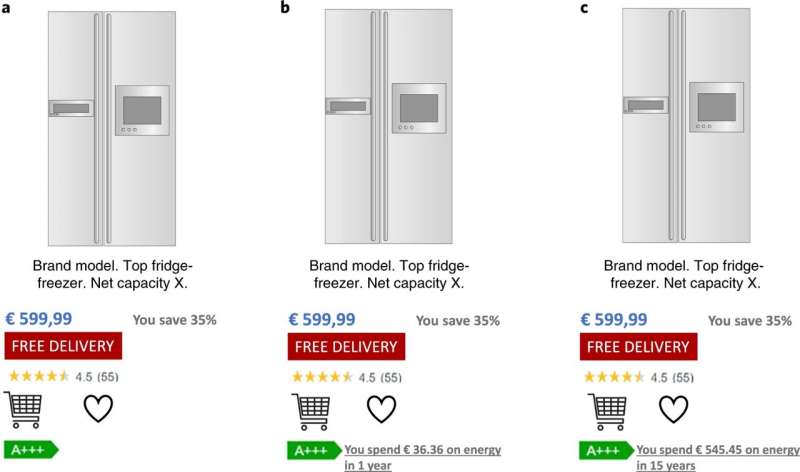
To guide consumers in their choice of electrical appliances and devices, over a decade ago the European Union introduced an energy efficiency labeling scheme. This scheme gives potential buyers an idea of much electrical energy is consumed by different devices, so that they can make more informed choices.
While energy efficiency labels can be quite informative, they are based on several different attributes, which are not all linked to the running costs of products. In other words, they provide a general idea of how energy efficient a device is, but do not tell consumers how much it would weigh on their monthly electricity bills compared to other devices.
Researchers at University of Milan, the Euro-Mediterranean Center on Climate Change (CMCC), and Peking University have recently carried out a study investigating whether the addition of accurate energy cost information to EU energy labels could impact consumer choices. Their findings, outlined in a paper published in Nature Energy, suggest that this cost-related information is of interest to consumers and its addition could actually impact their appliance purchases.
“Our recent paper is part of a stream of research funded by an ERC starting grant won by Massimo Tavoni on behavioral drivers of energy efficient choices,” Giovanna d’Adda, one of the researchers who carried out the study told TechXplore. “A general theme of the project is how the provision of information can overcome the behavioral barriers to energy conservation behaviors and investments in energy efficiency.”
In a previous paper published in Nature Energy, Tavoni, d’Adda Gao, and their colleagues specifically examined human behaviors that can promote greater energy efficiency. While they were reflecting on customers’ choices of appliances based on energy efficiency, they highlighted the lack of salient and accurate energy cost information, which is not effectively conveyed by standard EU energy labels.
“We exploited a collaboration with an Italian online retailer to conduct a field experiment,” d’Adda explained. “Users of the website who were searching for a refrigerator were randomly assigned to either view the energy cost information (either yearly or lifetime, also randomly) in addition to the standard energy label, or just the standard energy label. We used website navigation and purchase data from the retailer to evaluate whether users assigned to view the energy cost information searched for and purchased different products, by comparing the behavior of these randomly selected groups.”
The simple consumer test carried out by d’Adda and her colleagues involved 126,614 people who were purchasing a new refrigerator. Approximately half of these consumers were only provided with the standard EU energy label, while the other half were also given information about the yearly or lifetime energy cost for all the products they were choosing between.
Interestingly, the researchers found that adding this simple and accurate energy cost information significantly affected the consumers’ choices. In other words, many people who were also made aware of the appliances yearly or lifetime energy costs made different choices than those who only had access to the EU energy labels, preferring devices with lower energy costs.
“Consumers want to minimize the total cost of the appliances that they buy, which includes both the price and the lifetime energy cost,” d’Adda said. “Adding energy cost information to the standard EU label helps consumers achieve this goal. However, the economic savings come at a cost in terms of the time spent searching for the additional information, which requires effort to be processed, so search time increases for consumers assigned to view it. So, the welfare implications of our information treatment are not clear yet.”
Overall, the recent study by this team of researchers suggests that EU energy efficiency labels alone might not be enough to effectively guide consumers in their choice of new appliances. In the future, it could thus inspire policy makers wishing to encourage consumers to purchase appliances with a lower absolute levels of energy consumption to also introduce energy cost-related labels. This could be particularly useful in today’s global landscape, which is marked by rising energy prices.
“In our next studies, we would like to further explore how contextual features, such as the salience of energy prices or of climate change, affect the impact of information aimed at encouraging energy efficiency,” d’Adda added. “In addition, we are interested both in the direct effects of information on targeted behaviors, and in the indirect ones on other related pro-environmental actions.”
Giovanna d’Adda et al, A randomized trial of energy cost information provision alongside energy-efficiency classes for refrigerator purchases, Nature Energy (2022). DOI: 10.1038/s41560-022-01002-z
© 2022 Science X Network
Citation:
Adding energy cost information to energy-efficiency class labels could affect refrigerator purchases (2022, May 3)
retrieved 3 May 2022
from https://techxplore.com/news/2022-05-adding-energy-energy-efficiency-class-affect.html
This document is subject to copyright. Apart from any fair dealing for the purpose of private study or research, no
part may be reproduced without the written permission. The content is provided for information purposes only.
Stay connected with us on social media platform for instant update click here to join our Twitter, & Facebook
We are now on Telegram. Click here to join our channel (@TechiUpdate) and stay updated with the latest Technology headlines.
For all the latest Technology News Click Here
For the latest news and updates, follow us on Google News.
